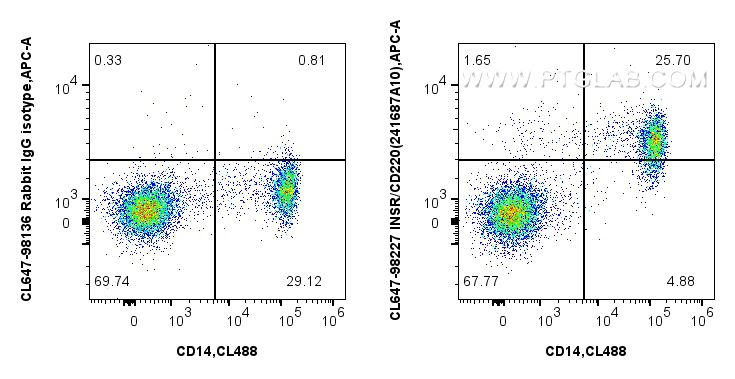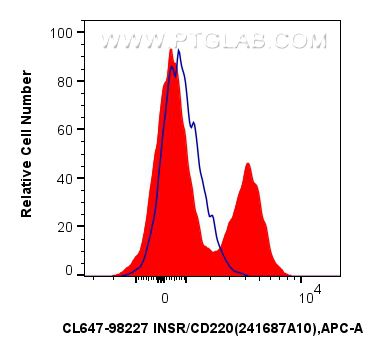Tested Applications
| Positive FC detected in | human PBMCs |
Recommended dilution
| Application | Dilution |
|---|---|
| Flow Cytometry (FC) | FC : 5 ul per 10^6 cells in 100 μl suspension |
| This reagent has been pre-titrated and tested for flow cytometric analysis. The suggested use of this reagent is 5 ul per 10^6 cells in a 100 µl suspension or 5 ul per 100 µl of whole blood. | |
| Sample-dependent, Check data in validation data gallery. | |
Product Information
CL647-98227 targets INSR/CD220 in FC applications and shows reactivity with human samples.
| Tested Reactivity | human |
| Host / Isotype | Rabbit / IgG |
| Class | Recombinant |
| Type | Antibody |
| Immunogen | Recombinant protein Predict reactive species |
| Full Name | INSR |
| GenBank Accession Number | BC117172 |
| Gene Symbol | INSR |
| Gene ID (NCBI) | 3643 |
| Conjugate | CoraLite® Plus 647 Fluorescent Dye |
| Excitation/Emission Maxima Wavelengths | 654 nm / 674 nm |
| Form | Liquid |
| Purification Method | Protein A purification |
| UNIPROT ID | P06213 |
| Storage Buffer | PBS with 0.09% sodium azide and 0.5% BSA, pH 7.3. |
| Storage Conditions | Store at 2-8°C. Avoid exposure to light. Stable for one year after shipment. |
Background Information
The biological effects of INS are mediated by a membrane-spanning cell surface receptor that has been shown to consist of disulfide-linked alpha-subunits (135 kDa) and beta-subunits (95 kDa) that are cleaved products of a common precursor. The binding of INS to the receptor extracellular domain results in intracellular activation of a tyrosine-specific kinase activity and the generation of signals that determine the cellular response (PMID: 2369896).
Protocols
| Product Specific Protocols | |
|---|---|
| FC protocol for CL Plus 647 INSR/CD220 antibody CL647-98227 | Download protocol |
| Standard Protocols | |
|---|---|
| Click here to view our Standard Protocols |





